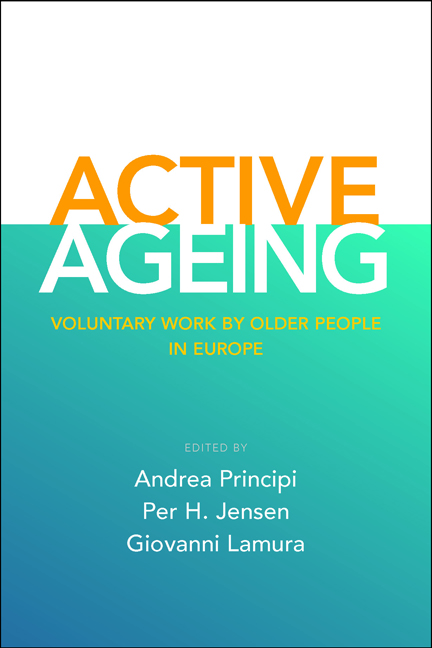Book contents
- Frontmatter
- Contents
- List of tables and figures
- Notes on the contributors
- Acknowledgements
- Foreword
- Part I Realising volunteering by older people in Europe An overarching approach
- Part II Opportunities and restrictions for older volunteers National experiences
- Part III Opportunities and restrictions for older volunteers Case studies in European voluntary organisations
- Part IV Conclusions
- Index
seven - Older volunteers in France: recognising their social utility in a less and less corporatist welfare state
Published online by Cambridge University Press: 05 March 2022
- Frontmatter
- Contents
- List of tables and figures
- Notes on the contributors
- Acknowledgements
- Foreword
- Part I Realising volunteering by older people in Europe An overarching approach
- Part II Opportunities and restrictions for older volunteers National experiences
- Part III Opportunities and restrictions for older volunteers Case studies in European voluntary organisations
- Part IV Conclusions
- Index
Summary
Introduction
In international comparisons, the French welfare state is usually classified as continental and ‘corporatist’: generous welfare benefits are funded by contributions related to occupational status and managed jointly by representatives of employer and trade union organisations (Esping Andersen, 1990). However, the welfare state has become more heterogeneous given changes over the past 30 years; it has now taken on characteristics of other welfare ‘models’ depending on the type of risk covered (Barbier and Théret, 2009). The French welfare state, as in other European countries, is seeking to redefine itself as a social investment state, where the prevention of social risks is as important, if not more important, than compensation for them. The characteristics of the French welfare state and its evolution have created certain relations between public authorities and the non-profit sector.
The non-profit sector in France is characterised by a high level of social expenditure financed by public authorities, and the relatively large size of this sector, with a historical core of big associations, both financed and overseen by the public administration and a Bismarckian type social security system (CPCA, 2008). The Johns Hopkins programme for comparing non-profit sectors in several countries thus qualified the relations of French public authorities with voluntary organisations as ‘corporatist’ (Salamon and Anheier, 1998). However, nowadays this model in France reproduces the main features of the liberal model as far as cooperation between non-profit organisations and public authorities has evolved from institutional oversight towards a contractual partnership based on a shared responsibility for social investment (Archambault, 2002, 2012).
The heterogeneous nature of the French ‘third sector’ – which comprises cooperatives, mutual aid societies and foundations as well as the non-profit organisations (or associations) at the centre of this chapter – can largely be put down to its regulation based on the principle of social utility. This principle underlies the standards for cooperation between non-profit organisations and public authorities. Recognising the social utility of volunteering is an official priority of associative public policy but, as argued later, the situation is different regarding senior volunteers.
With its 14 million volunteers giving their time to more than a million active associations (with more than 60,000 associations created each year since 2003), the French non-profit sector is relatively dynamic.
- Type
- Chapter
- Information
- Active AgeingVoluntary Work by Older People in Europe, pp. 149 - 172Publisher: Bristol University PressPrint publication year: 2014



